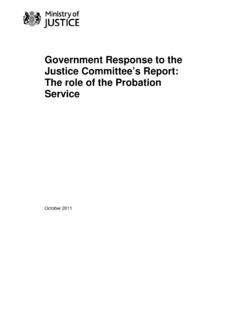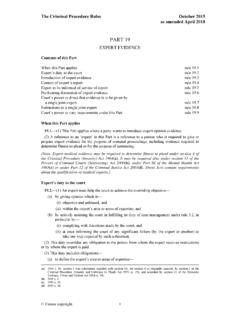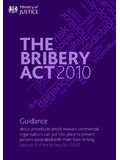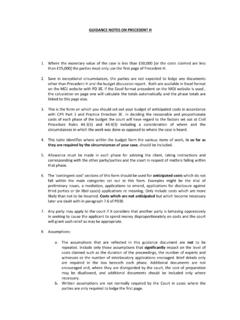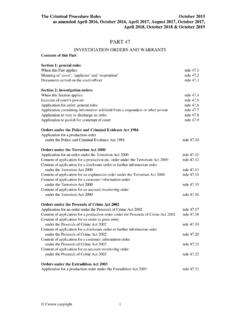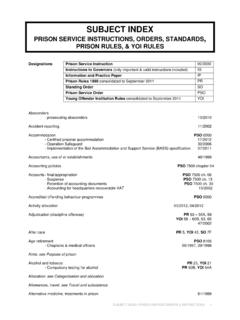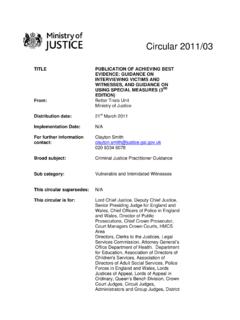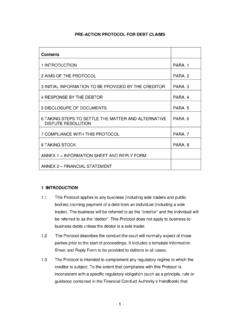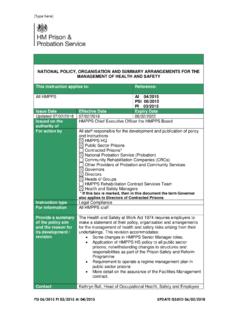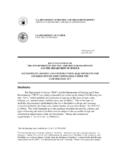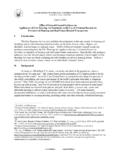Transcription of PART 7 - Justice
1 The Criminal Procedure Rules October 2015 as amended April 2018 Crown copyright 1 PART 7 STARTING a prosecution in a magistrates court Contents of this Part When this Part applies rule for summons, etc. rule of offence in application for summons, etc. or chargerule , warrant and requisition rule this Part applies (1) This Part applies in a magistrates court where (a) a prosecutor wants the court to issue a summons or warrant under section 1 of the Magistrates Courts Act 1980(a); (b) a prosecutor with the power to do so issues (i) a written charge and requisition, or (ii) a written charge and single Justice procedure notice under section 29 of the Criminal Justice Act 2003(b); (c) a person who is in custody is charged with an offence.
2 (2) In this Part, authorised prosecutor means a prosecutor authorised under section 29 of the Criminal Justice Act 2003 to issue a written charge and requisition or single Justice procedure notice. [Note. Under section 1 of the Magistrates Courts Act 1980, on receiving a formal statement (described in that section as an information ) alleging that someone has committed an offence, the court may issue (a) a summons requiring that person to attend court ; or (b) a warrant for that person s arrest, if (i) the alleged offence must or may be tried in the Crown court , (ii) the alleged offence is punishable with imprisonment, or (iii) the person s address cannot be established sufficiently clearly to serve a summons or requisition.]
3 The powers of the court to which this Part applies may be exercised by a single Justice of the peace. Under section 29 of the Criminal Justice Act 2003, a prosecutor authorised under that section may issue a written charge alleging that someone has committed an offence, and either (a) a requisition requiring that person to attend court ; or (a) 1980 c. 43; section 1 was amended by section 68 of, and paragraph 6 of Schedule 8 to, the Criminal Justice Act 1991 (c.)
4 53), sections 43 and 109 of, and Schedule 10 to, the Courts Act 2003 (c. 39), section 31 of, and paragraph 12 of Schedule 7 to, the Criminal Justice Act 2003 (c. 44) and section 153 of the Police Reform and Social Responsibility Act 2011. It is further amended by paragraphs 7 and 8 of Schedule 36 to, the Criminal Justice Act 2003 (c. 44), with effect from a date to be appointed. (b) 2003 c. 44; section 29 has been brought into force for certain purposes only (see 2007/1999, 2008/1424, 2009/2879, 2010/3005, 2011/2188, 2012/825 and 2014/633). It was amended by section 50 of, and paragraph 130 of Schedule 4 to, the Commissioners for Revenue and Customs Act 2005 (c.
5 11), section 59 of, and paragraph 196 of Schedule 4 to, the Serious Organised Crime and Police Act 2005 (c. 15), section 15 of, and paragraph 187 of Schedule 8 to, the Crime and Courts Act 2013 (c. 22), 2014/834 and section 46 of the Criminal Justice and Courts Act 2015 (c. 2). The Criminal Procedure Rules October 2015 as amended April 2018 Crown copyright 2(b) a notice that the single Justice procedure under section 16A of the Magistrates Courts Act 1980(a) and rule of these Rules applies. Section 30 of the 2003 Act(b) contains other provisions about written charges, requisitions and single Justice procedure notices.
6 A person detained under a power of arrest may be charged if the custody officer decides that there is sufficient evidence to do so. See sections 37 and 38 of the Police and Criminal Evidence Act 1984(c).] Application for summons, etc. (1) A prosecutor who wants the court to issue a summons must (a) serve on the court officer a written application; or (b) unless other legislation prohibits this, present an application orally to the court , with a written statement of the allegation or allegations made by the prosecutor. (2) A prosecutor who wants the court to issue a warrant must (a) serve on the court officer (i) a written application, or (ii) a copy of a written charge that has been issued; or (b) present to the court either of those documents.
7 (3) An application for the issue of a summons or warrant must (a) set out the allegation or allegations made by the applicant in terms that comply with rule (Allegation of offence in application or charge); and (b) demonstrate (i) that the application is made in time, if legislation imposes a time limit, and (ii) that the applicant has the necessary consent, if legislation requires it. (4) As well as complying with paragraph (3), an application for the issue of a warrant must (a) demonstrate that the offence or offences alleged can be tried in the Crown court ; (b) demonstrate that the offence or offences alleged can be punished with imprisonment; or (c) concisely outline the applicant s grounds for asserting that the defendant s address is not sufficiently established for a summons to be served.
8 (5) Paragraph (6) applies unless the prosecutor is (a) represented by a legal representative for the purposes of the application under this rule; (b) a public authority within the meaning of section 17 of the prosecution of Offences Act 1985(d); or (a) 1980 c. 43; section 16A was inserted by section 48 of the Criminal Justice and Courts Act 2015 (c. 2). (b) 2003 c. 44; section 30 has been brought into force for certain purposes only (see 2007/1999, 2008/1424, 2009/2879, 2010/3005, 2011/2188, 2012/825 and 2014/633).
9 It was amended by article 3 of, and paragraphs 45 and 46 of the Schedule to, 2004/2035 and section 47 of the Criminal Justice and Courts Act 2015 (c. 2). (c) 1984 c. 60; section 37 was amended by section 108(7) of, and Schedule 15 to, the Children Act 1989 (c. 41), sections 72 and 101(2) of, and Schedule 13 to, the Criminal Justice Act 1991 (c. 53), sections 29(4) and 168(3) of, and Schedule 11 to, the Criminal Justice and Public Order Act 1994 (c. 33), section 28 of, and paragraphs 1 and 2 of Schedule 2 to, the Criminal Justice Act 2003 (c. 44), section 23(1) of, and paragraphs 1 and 2 of Schedule 1 to, the Drugs Act 2005 (c.)
10 17) and sections 11 and 52 of, and paragraph 9 of Schedule 14 to, the Police and Justice Act 2006 (c. 48). Section 38 was amended by section 108(5) of, and paragraph 53 of Schedule 13 to, the Children Act 1989 (c. 41), section 59 of the Criminal Justice Act 1991 (c. 53), sections 24, 28 and 168(2) of, and paragraph 54 of Schedule 10 to, the Criminal Justice and Public Order Act 1994 (c. 33), section 57 of the Criminal Justice and court Services Act 2000 (c. 43), section 5 of, and paragraph 44 of Schedule 32 and paragraph 5 of Schedule 36 to, the Criminal Justice Act 2003 (c. 44), section 23 of, and paragraphs 1 and 3 of Schedule 1 to, the Drugs Act 2005 (c.
